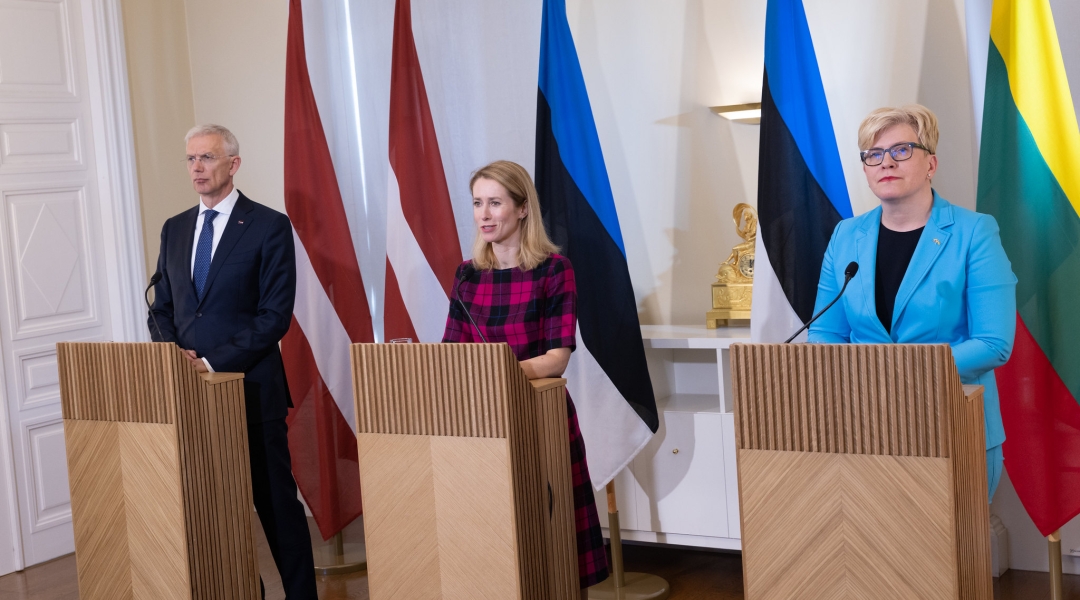Today we focused on one of the major challenges facing us - ensuring our energy security. This is a priority issue. Synchronising our power systems with Central Europe successfully and effectively was among the first topics discussed by my new government.
Ingrida, please accept my congratulations on Lithuania’s successful isolation test in April. As for the next steps, it is important for Estonia that this joint Baltic project, which was started considering the strategic interests of all three countries, continues in the same spirit of cooperation and unity.
This is why Estonia supports accelerating synchronization. Technical studies - especially on production capacity and energy prices - will allow us to clarify the details and exact timing of this process. We are waiting for the studies with great interest. The key is to work together to ensure the security of supply and minimise the risks for our consumers.
Today we agreed to continue discussions on accelerating synchronisation as soon as all of the technical studies are finished. In doing so, we will try to find a joint timeline for acceleration. Ministers responsible for energywill continue working on details. And we will continue to coordinate closely with the European Commission and Poland.
Dear colleagues,
Ukraine’s fight for freedom and our efforts to end the cycle of Russian aggression are far from over. The free world must be ready for a long-term effort.
We must continue our joint efforts to ensure Ukraine’s victory.
The European Union’s agreement to send 1 million rounds of artillery ammunition to Ukraine was an important milestone. For the initiative to deliver, all member states must do their share as soon as possible. The ammunition Estonia decided to send has already reached Ukraine.
We must also move ahead with the use of Russia’s frozen assets for Ukraine’s reconstruction. At the European Council meeting in June, we expect a decision on how we will go forward. We must make the aggressor pay for everything it destroys.
We must continue our efforts to help Ukraine to win not only its fight for freedom but also its fight for justice. We have come a long way to make sure that there will be no impunity, no immunity for war criminals. Half a year ago, most were not ready to publicly support the idea of a special tribunal for the crime of aggression. Now we are discussing it among leaders, and we are discussing its legal modalities. Just today, Estonia is hosting a meeting of the core group, made up of over 30 countries, dedicated to establishing the special tribunal.
Earlier this week, we celebrated Europe Day. And for the first time, Ukraine celebrated this day as Europe Day. We hope Ukraine can launch accession negotiations with the EU this year. The requirements need to be fulfilled 100% and Ukraine has already made a lot of progress on reforms during wartime. As Ursula von der Leyen clearly expressed in Kyiv, the implementation of the seven steps should lead to the opening of negotiations.
Today, we also focused on preparations for the NATO summit in Vilnius. Living next to a pariah state, we all understand very well that the only way to lasting peace is to end grey areas in European security. Our region is a living example of it. This is why for peace in Europe, we need Ukraine in the European Union and we need Ukraine in NATO. And we need a positive message for Ukraine from NATO’s Vilnius Summit this July.
From Vilnius, we also expect decisions that put forward defence into practice on NATO’s Eastern Flank. First and foremost, NATO’s new regional defence plans must be a in place and backed up by necessary forces and capabilities.
To strengthen its deterrence and defence posture long-term, NATO needs investments. This is why support setting 2% of GDP as an immediate commitment to all Allies and a longer-term goal of 2,5% to be reached by 2030. Estonia is doing its share: raising defence spending to 3% of GDP, working to improve our defence readiness and increasing the size of the Estonian armed forces.
Thank you for being in Tallinn and look forward to continuing the conversation with you at the opening of the Lennart Meri Conference this evening.
